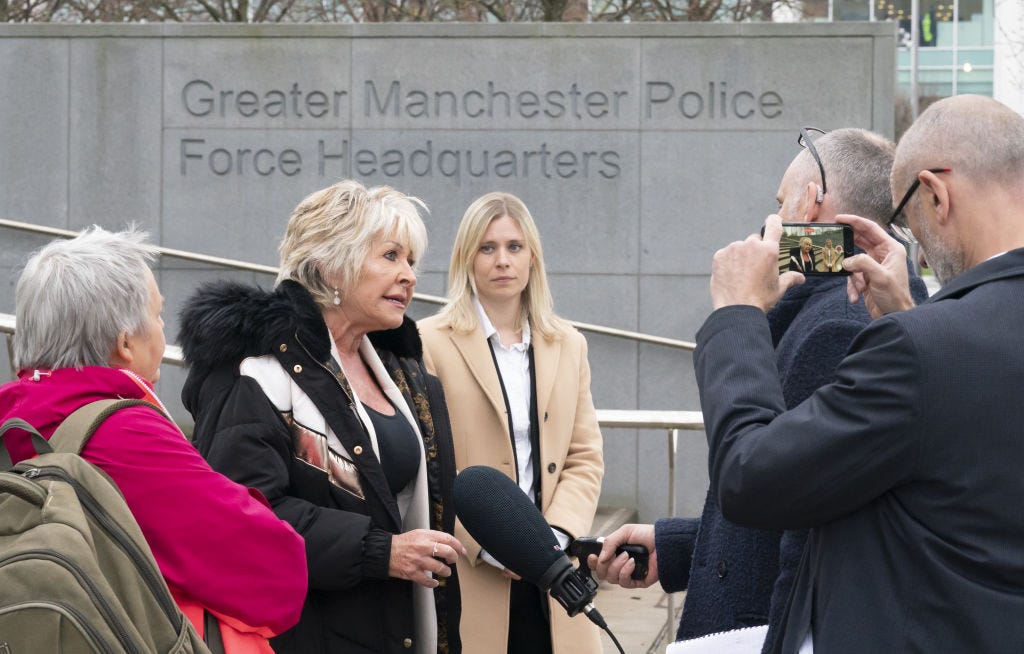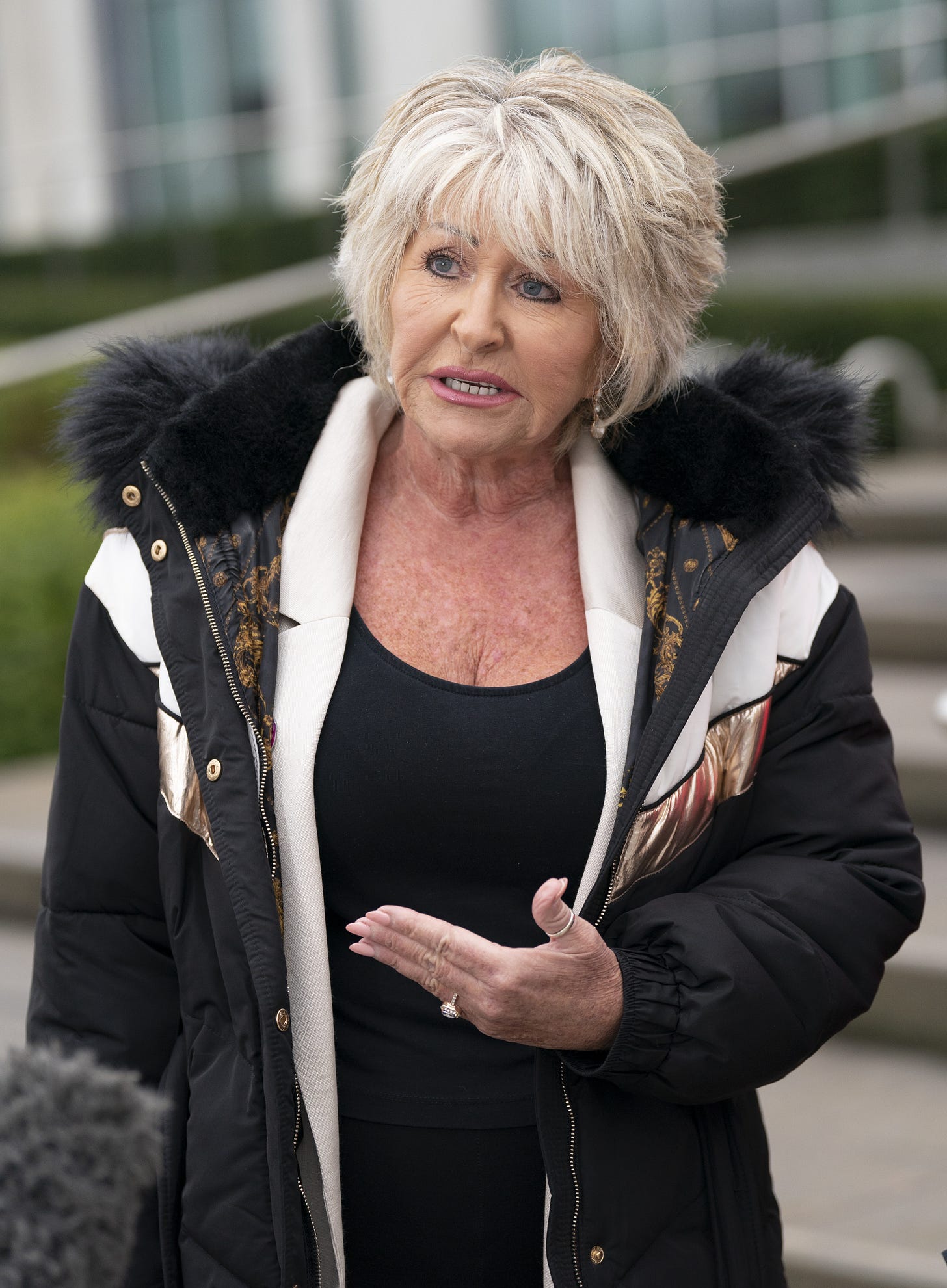A small sample of my writing over the past 15 years on so-called grooming gangs
Why give racist misogynistic men credit for the work of feminists? It's offensive to dismiss the role of survivors, mothers of victims, & all that paid attention to the atrocity way before most others
Former police whistle blower, Maggie Oliver, with lawyers representing a number of the Rochdale victims, Harriet Wistrich (left) and Kate Ellis
2006/7: I wrote my first piece on the phenomenon in late 2006 (finally published in 2007) for the Sunday Times Magazine, having been told by my editor at the Guardian that “We will be seen as racist” as a reason for not commissioning it. Headlined Mothers of Prevention it focussed on the tireless work of feminists and the mothers of victims in exposing this atrocity.
Soon after publication, my name was added to a website, Islamophobia Watch, because, according to the hard leftist men that ran it, to even mention the ethnicity of the perpetrators was akin to incitement to racial hatred.
It was four years later that Andrew Norfolk at the Times claimed to have ‘broken the story’.
2008: I wrote about the case of Charlene Downes, published in the Guardian on 30th May, headlined, ‘Beyond the pleasure beach’, with the strap line, ‘Blackpool has a terrible secret: shockingly high levels of child sex abuse. Julie Bindel reports how the disappearance of a teenage girl revealed a dark side of the holiday resort’.
The story was everywhere by then, with the Times having put a huge amount of resources into investigating it, so even the Guardian could not justify ignoring it any longer.
I wrote:
There is some evidence that disproportionate numbers of men from migrant communities are involved in the abuse of girls. Opportunism is one possible explanation, according to a police officer who worked on missing children cases. "A number of them work illegally in the takeaways, which is where a lot of the vulnerable girls either work for pocket money, or hang out."
There are approximately 800 convicted high-risk sex offenders living in Blackpool. Many choose to move there after their release from prison. "Why do so many child abusers want to live in Blackpool?" asks Wendy Shepherd from children's charity Barnardos. "Alongside the increase in child sexual exploitation there is a marked increase in the sex industry in Blackpool, and sex tourism masquerading as stag weekends. Questions need to be asked about the links."
Charlene Downes
2012: Published in the Guardian on May 9th, headlined The victims of sex gangs are never heard, I railed against the complacency about organised sexual exploitation and the tiny number of convictions, regardless of the ethnicity of perpetrators.
I wrote:
It is my firm belief, based on interviews with a number of victims, family members, campaigners and professionals such as police and social workers, that where the gangs are of Asian origin there has been a tendency in some areas of England to ignore the issue for fear of being branded racist. I have also been clear that ethnicity of perpetrators is indeed relevant, in that folk seem to be more interested and appalled by criminal gangs raping girls when the gang is Asian. Contrary to what the British National party would have us believe, this is not an epidemic of Pakistani child abusers abusing white girls – it is more that we as a society ignore the voices of those who know best about child abuse: the victims and their advocates.
2017: Independent Newspaper, 17th May, I wrote a piece headlined: ‘I wrote the first ever piece about the grooming gang scandal in northern English towns in 2006 – but the media didn't want to know’.
Reading the publicity on the three-part TV drama, Three Girls, based on the true story of the teenage victims of organised child abusers in Rochdale, I am reminded not just of the bravery and tenacity of those involved in exposing the levels of organised child abuse in the UK, but also of the cowards and the deniers who for so long refused to accept the harm being done to children by violent exploiters.
Well over a decade ago I was interviewing these “deniers”, and being fobbed off by social workers, police officers, and some newspaper editors who refused to accept the scale of the abuse I and other campaigners (including the mothers of some of the victims) had uncovered.
Many years before the award-winning journalist Andrew Norfolk wrote his first piece about the grooming gangs in northern towns in England, I was investigating this phenomenon. But despite the quality of material I had amassed, it took me until 2007 to get my first piece published because some editors feared an accusation of racism.
2017: Independent Newspaper, 11th August 2017, headlined, ‘There's a conversation to be had about race in the Newcastle sex abuse scandal – and we should be brave enough to have it’ this article focused on why some white liberals appear to bend over backwards to find a way to claim the perpetrators are ‘set up’. I wrote:
While on the one hand the racists and fascists twist the truth about child sexual abuse to give kudos to their arguments against asylum seekers and black and minority ethnic British citizens, much of the liberal left wring their hands and worry about being labelled “racist”.
It would appear that this matters more to some that preventing the rape of children and young women.
I was accused of demonising the entire British Asian community by specifying the fact that these particular criminal gangs originated from Pakistan. My reason for mentioning ethnicity at all was to raise the unavoidable fact that some child protection agencies, and a number of senior police officers have made it plain that they were taking a hands-off approach in such cases lest they were labelled racist.
2019: Published in the Telegraph on 21st July, my interview with former police whistle blower, Maggie Oliver. Headlined ‘Rochdale whistleblower Maggie Oliver on her new charity and how grooming gangs are still abusing girls today’.
“They were written off as slags. Senior officers were far more concerned with keeping the lid on the shocking levels of child sexual abuse than they were about the girls.
“We had suspects coming in to be interviewed before we had even spoken to one of the victims. The offenders were already known to GMP, and had been since 2008.”
2022: This piece was published in the Observer on 17th April. Based on an interview with *Amber, one of the Rochdale victims, I wrote that:
Last Tuesday Amber, with two other victims of the Rochdale grooming gang, finally received an apology delivered personally by Stephen Watson, the chief constable of Greater Manchester police (GMP). Their treatment encompasses a range of catastrophic errors in one of the country’s most harrowing child sexual abuse scandals.
2023: The Sun published my piece on 9th November headlined, THE LOST GIRL: Inside teen Charlene Downes’ appalling unsolved murder and why many in Blackpool have turned their back on her parents.
The article explored the complicity of Downes’ parents, and looked at the events during the 20 years since her disappearance. I wrote:
A mountain of evidence shows that Charlene had been known to social services as a child, both in the West Midlands and after the family moved to Blackpool. Social workers twice decided that Charlene should be in local authority care. The first time, no placement was available. The second, she was allowed to stay with her family.
And for all the racist assertions put about by the British National Party, the people that either initially abused or failed Charlene were of her own race, her own culture.
On the day their daughter disappeared, her parents were apparently too busy hosting a man later revealed to be a convicted paedophile to call the police, which her mother waited two whole days to do. Their guest had pleaded guilty to four counts of sexual abuse of ten-year-old children.
2024: In Al Jazeera, 23rd February, I wrote that, ‘The UK’s grooming gangs and the lessons never learned: It is high time for Britain’s criminal justice system to stop failing vulnerable girls victimised by predatory men.’
As I pointed out:
In August 2014, a groundbreaking report by former senior social worker Alexis Jay revealed that an estimated 1,400 children had been sexually abused in the town from 1997 to 2013, predominantly by Pakistani-British men. It revealed that council staff and others knew of the abuse but turned a blind eye to what was happening and refused to identify the perpetrators in part for fear of being branded racist.
The report laid bare the disastrous consequences of failing to prevent predatory men – of whatever racial background, for whatever reason – from accessing vulnerable victims.
2024: In Unherd, published on February 29th, I argued that:
[In Rochdale] allegations of sexual assault were simply not taken seriously by those in authority — a culture that infected the council for years, and endured right up to the moment the grooming gang scandal that also took place in Tasty Bites was finally laid bare in 2012. Dozens of vulnerable girls — some as young as 14 — had been plied with alcohol and cannabis, threatened with violence, and passed around man after man for sex, while the authorities ignored their pleas for help. The ringleader was found guilty of 30 counts of rape. A string of inquiries followed, concluding that those in authority “lacked human compassion” and were “inexcusably slow” in dealing with the victims — who were seen as making “life choices”, rather than suffering.







Julie, you are so tenacious, so determined. There is so much wrong with the way we treat children. Vital work. What journalism should be.
The society has become frozen in dealing with threats to women's safety. Children being less oppressed than certain ethnic or identity groups, harm to the children is seen as less important than protecting oppressed groups. You have written bravely and objectively but faced a system that favors protecting subjective determinations of who is more oppressed in making policing and policy determinations.